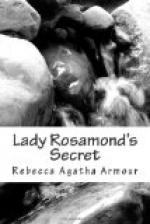Fanny Trevelyan was now busied in matters of great importance. Preparations were being made for the reception of Maude Bereford, Mary Douglas and Mr. Howe. Then she would hear still further of New Brunswick life—its pleasures and its inconveniences. Gaily did she perform the many little offices left to deft fingers and untiring patience. Maude had availed herself of the temporary absence of her invalid brother and his devoted wife. Three weeks were to be spent in the society of Trevelyan Hall. Fanny Trevelyan had a little secret project in her mind which gave much pleasure. She would be in a position to introduce Maude Bereford to the notice of her brother Guy. With girlish glee she anticipated much from the circumstance, wondering in what way her friend might be received at the hand of the last named gentleman.
On the other hand Captain Trevelyan had his plans to mature. Without consulting his sister’s opinion, he had a secret pleasure in the hope that his ever true friend might find much to admire in the young girl who was soon to be their guest. He had not the slightest wish to enter on any schemes by which his loved sister might be complicated. Fanny Trevelyan was fancy free. It was his fond hope that she remain so many years to come. Bitter experience taught Captain Trevelyan a lesson from which he could draw many useful hints and resolves. He was careful to guard against any exposure to which his loved sister might be subjected.
Amid these doubly laid plans the inmates of the hall welcomed their visitors, in whom were also included Captain Douglas. The sincerity of the latter was expressive in the humorous and hearty congratulations showered upon the genial host.
“Trevelyan, old boy, you are a mighty fine specimen of the old school! Egad, what would the Frederictonians say could they look in upon you now,” exclaimed the incorrigible Charles, with the ruling passion uppermost, while he threw himself upon an easy chair in a free and jovial manner.
“I am inclined to think that they would not be favorably impressed with such a wholesale exhibition were each one to repeat the same performance as yourself,” retorted Mr. Howe, assuming an air of nonchalance.
“Ah, I see how it is with my honored friend,” once more ventured Captain Douglas, “he already is maturing plans to place me at disadvantage before I have fairly secured entrance to Trevelyan Hall; but,” added the speaker, with an air of playful menace, “old chap the tables may turn, as they did many a time in Fredericton.”
Much as Mr. Howe regarded his friend, Charles Douglas, he wished that the last remark had not been made. Though it were said with the ease of unconscious and humorous gaiety, the quick glance of the secretary saw the instant effect. This was the only point on which he remained reticent to his bosom friend. They had been together for years. They had grown from childhood together, yet Captain Trevelyan’s




